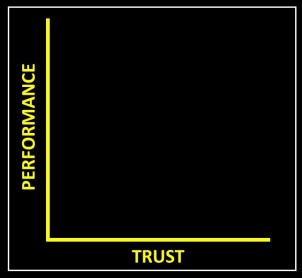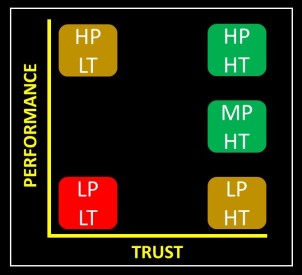What is more important when it comes to being a good field trainer – Performance or Trust?
Before you answer that, let’s explore why I’m asking the question. Author and speaker Simon Sinek works regularly with the Navy Seals. During one conversation he asked them how they select who gets to go to the elite Seal Team 6 or promoted since they are all considered to be the best of the best. To answer that question, they drew a graph like the one below. (Simon Sinek Performance vs. Trust Video)
 On the vertical axis they wrote “performance” and on the horizontal axis they wrote “trust.” Performance was defined as their skills and knowledge on the battlefield – shooting, tactics, orienteering, planning, endurance, etc. Trust was defined as how they are off of the battlefield – teamwork, integrity, respect, humble, etc. The Seals explained that they take each candidate and rank them on both of these criteria to see how they compare. Over time, they discovered the following…
On the vertical axis they wrote “performance” and on the horizontal axis they wrote “trust.” Performance was defined as their skills and knowledge on the battlefield – shooting, tactics, orienteering, planning, endurance, etc. Trust was defined as how they are off of the battlefield – teamwork, integrity, respect, humble, etc. The Seals explained that they take each candidate and rank them on both of these criteria to see how they compare. Over time, they discovered the following…
There were two candidates that were obvious. If the person was a Low Performer/Low Trust (LP/LT) they didn’t want them and if the person was a High Performer/High Trust (HP/HT) they absolutely wanted them. But, there were only so many candidates that were that clear and obvious.
 It was the next choice were the Seals discovered they were initially making mistakes in their selection process. Their next choice initially was the High Performer/Low Trust (HP/LT). The person who was a “rock star” in training and on the battlefield, but outside of that they weren’t really liked or trusted. The quote the Seals used was, “I would trust them with my life, but NOT my money or my wife.” This caused many, many issues within the ranks of one of the most elite special forces units in the world.
It was the next choice were the Seals discovered they were initially making mistakes in their selection process. Their next choice initially was the High Performer/Low Trust (HP/LT). The person who was a “rock star” in training and on the battlefield, but outside of that they weren’t really liked or trusted. The quote the Seals used was, “I would trust them with my life, but NOT my money or my wife.” This caused many, many issues within the ranks of one of the most elite special forces units in the world.
What was their fix?
After analyzing where the mistakes were occurring, they reorganized the hierarchy of their entire selection process. Instead of taking the High Performer/Low Trust Seals, they prioritized taking the Moderate Performer/High Trust (MP/HP) individuals. They then would equally consider even a Low Performer/High Trust (LP/HT) candidate in comparison to a High Performer/Low Trust one. This was done because after years of various difficulties and failures, the Navy Seals discovered that Performance can be taught, learned, and improved. Trust can only be earned and is a much more valuable commodity when making such decisions of significance.
How does this relate to Field Training?
First, no one that works with you is going to care if you have the most tickets, most arrests, find the most drugs, take the most calls for service, or get the coolest assignment; if they don’t trust you. Do things often that build trust – back up other officers, help with impounds, take paper when you know they are down a lot . . . in other words, help other people out sometimes. That not only will help those around you, but will also make a huge difference when it comes to testing for special assignments or promotion.
Secondly, the same concept applies to the OITs (Officer-in-Training) you are training. It is great if they are a natural cop and are kicking butt through FTO (Field Training Officer), but if they are showing behaviors that make your level of trust in them diminish, then you should be cautious. Would you trust your money and spouse around them? If not, try to articulate why and document it. The FTO Program would rather remove a low trust OIT than have them make it through and be a pain for the next 25 years or until they cause a significant integrity issue of some kind.
Lastly, as a Field Training Officer, you will find that your ability to train and the success of your OITs is directly related to the level of trust you build with them during the short time you have them for training. Here are 3 tips for quickly building trust with OITs…
- When you first meet them, introduce yourself and explain that everything you from here on out is for their benefit to make them a successful solo capable officer. If you say it with conviction, they will believe you and you will immediately be establishing a rapport built on trust; even if you have to get on them about something.
- Be up front about the expectation for them to make mistakes. Explain that you would rather see them take initiative on a call for service and make a mistake; rather than, hang back waiting watching other officers do the work and not make a mistake. If you are going to be upset and/or frustrated with an OIT, be upset/frustrated at the lack of initiative, not the mistake. Training can fix the mistake. Initiative is built on trust.
- Take the time to introduce yourself. Tell them about your family, life outside the PD, struggles you’ve experienced, and successes you’ve had. Then ask them about who they are. What is their family situation, what did they do before coming to SPD, why do they want to be a cop, what has been the hardest for them in FTO so far, how are they adjusting to shift work, etc. You never know where those conversation will go. OITs have to know you care about them before they will ever care about what you have to teach them. TRUST > PERFORMANCE
The mission at Thin Blue Line of Leadership is to inspire law enforcement supervisors to be the best leaders they can be by providing positive leadership tactics and ideas. Positive leadership and creating a positive squad culture are on-going commitments that must be nurtured and developed over time. Thin Blue Line of Leadership is here to help.
Please do not hesitate to contact us if you have ideas to share or suggestions for improvement. Your thoughts or comments on this blog are always appreciated either below or on our Facebook page. You can also follow us on Twitter at @tbl_leadership.
Continue saving the world one call at a time and as always, LEAD ON!



 On the vertical axis they wrote “performance” and on the horizontal axis they wrote “trust.” Performance was defined as their skills and knowledge on the battlefield – shooting, tactics, orienteering, planning, endurance, etc. Trust was defined as how they are off of the battlefield – teamwork, integrity, respect, humble, etc. The Seals explained that they take each candidate and rank them on both of these criteria to see how they compare. Over time, they discovered the following…
On the vertical axis they wrote “performance” and on the horizontal axis they wrote “trust.” Performance was defined as their skills and knowledge on the battlefield – shooting, tactics, orienteering, planning, endurance, etc. Trust was defined as how they are off of the battlefield – teamwork, integrity, respect, humble, etc. The Seals explained that they take each candidate and rank them on both of these criteria to see how they compare. Over time, they discovered the following… It was the next choice were the Seals discovered they were initially making mistakes in their selection process. Their next choice initially was the High Performer/Low Trust (HP/LT). The person who was a “rock star” in training and on the battlefield, but outside of that they weren’t really liked or trusted. The quote the Seals used was, “I would trust them with my life, but NOT my money or my wife.” This caused many, many issues within the ranks of one of the most elite special forces units in the world.
It was the next choice were the Seals discovered they were initially making mistakes in their selection process. Their next choice initially was the High Performer/Low Trust (HP/LT). The person who was a “rock star” in training and on the battlefield, but outside of that they weren’t really liked or trusted. The quote the Seals used was, “I would trust them with my life, but NOT my money or my wife.” This caused many, many issues within the ranks of one of the most elite special forces units in the world.